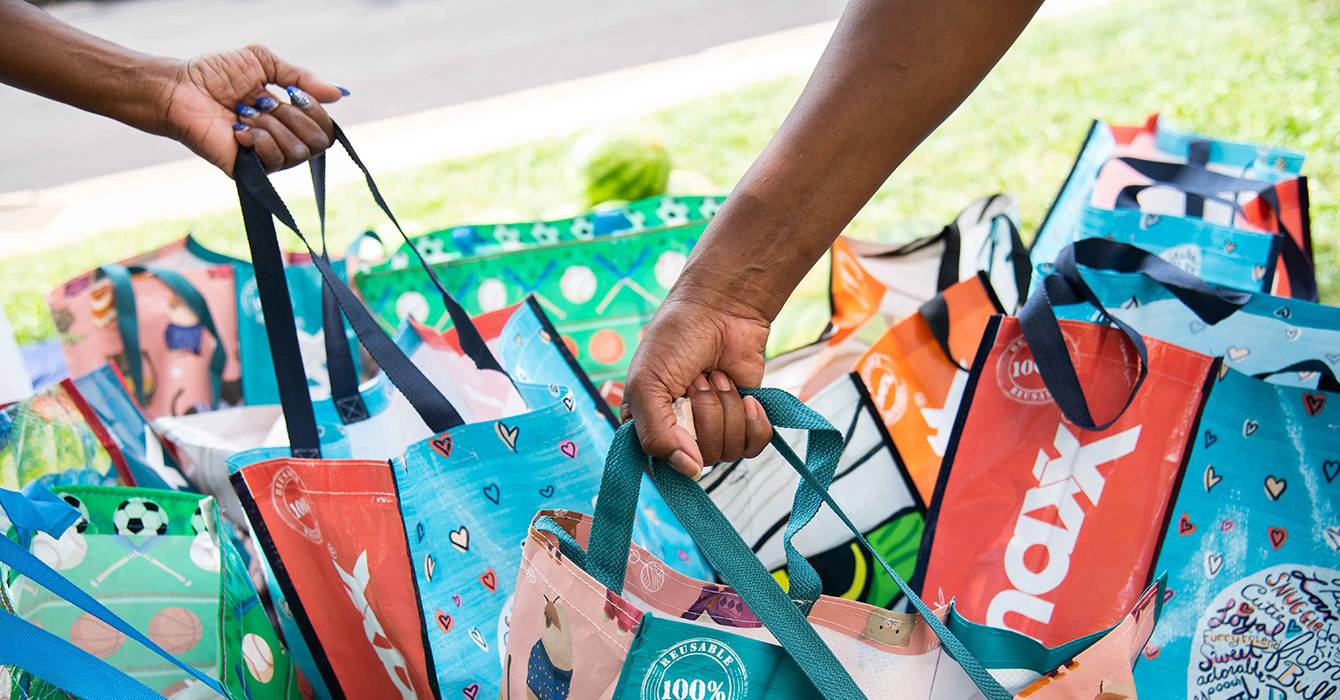On a warm mid-September Saturday, a handful of volunteers sporting casual clothes, orange safety vests and face masks load a wagon with fresh fruit outside Mount Olive Baptist Church. In this secluded Arlington neighborhood mere minutes from the Pentagon, people drive up, and a few walk up, to a folding table in front of the church.
What’s the draw? Church volunteers have gathered to distribute 150 reusable shopping bags filled with fresh cabbage, rice, carrots and whole chickens as part of Mount Olive Baptist’s Olive Cart ministry.
Since early 2020, even as it had to close its doors to in-person worship during the pandemic, Mount Olive has prioritized its food ministry and work with the community. They have seen a need for this help, the church’s senior pastor, the Rev. Dr. James E. Victor Jr., explains, because the food insecurity of some church members and people in the surrounding community has grown.
On this Saturday, as event visitors pick up their items, usually within a few seconds, the residential neighborhood in Arlington, Virginia, is more or less quiet — apart from the friendly chatter of church volunteers and the sound of the occasional plane rumbling overhead.
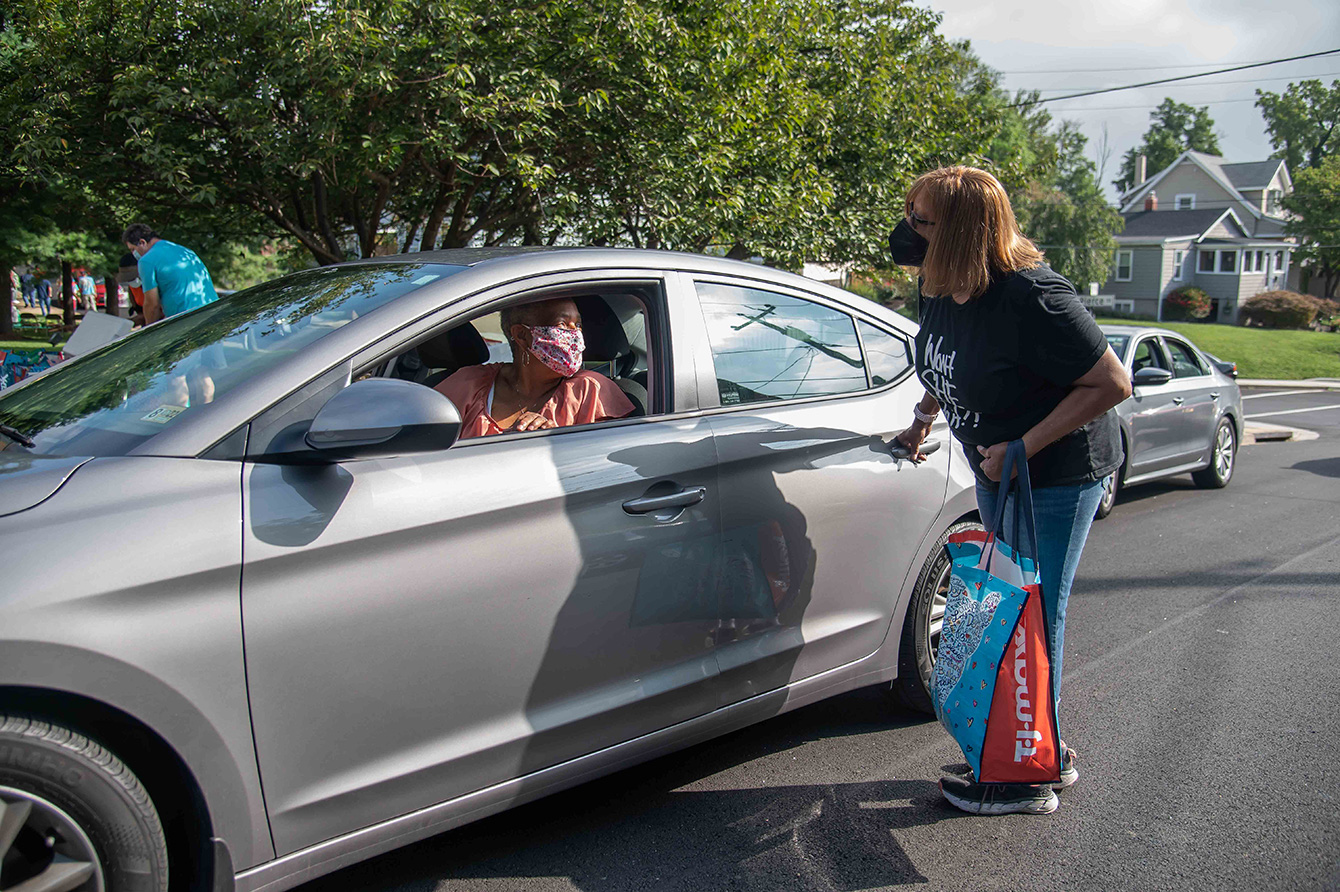
The volunteers (about 20 in all) have their tasks nearly down to a science, perfected over the many food distributions they have completed since August 2020. The day before, they had gathered at the church to load reusable shopping bags with fresh cabbage, rice and carrots from a local food bank. And they’d stored dozens of accompanying whole chickens, to supplement the food bank offerings, in the freezer.
That prep work paved the way for the seamlessly choreographed final assembly atop green and blue tarps, in a process designed to help recipients get in and out quickly. When the food is all set, the volunteers bow their heads, praying for blessings for the people who will come.

At 10 a.m., when the giveaway event officially begins, cars begin to trickle in, eventually building to more of a flow. The volunteers know exactly what to do.
Seeing the need and taking action
Service is a thread that has run through Mount Olive’s ministries since well before the pandemic, but the pandemic crisis has clarified the community’s needs.
Victor, the senior pastor, says the church serves the community without judgment.
“It’s important, during this unprecedented time in our lifetimes, that the church be at the forefront of serving others in whatever capacities they can,” he said.
The food giveaways are open to everyone, Victor said, calling that work a “sacred act of caring for our neighbors who may be in need.”
The care starts with good quality food. The church either buys produce from a local farm or uses donations from a local food bank, and then purchases protein such as chicken or turkey to supplement the offerings.
What listening practices attune your faith community to the needs of your neighbors?
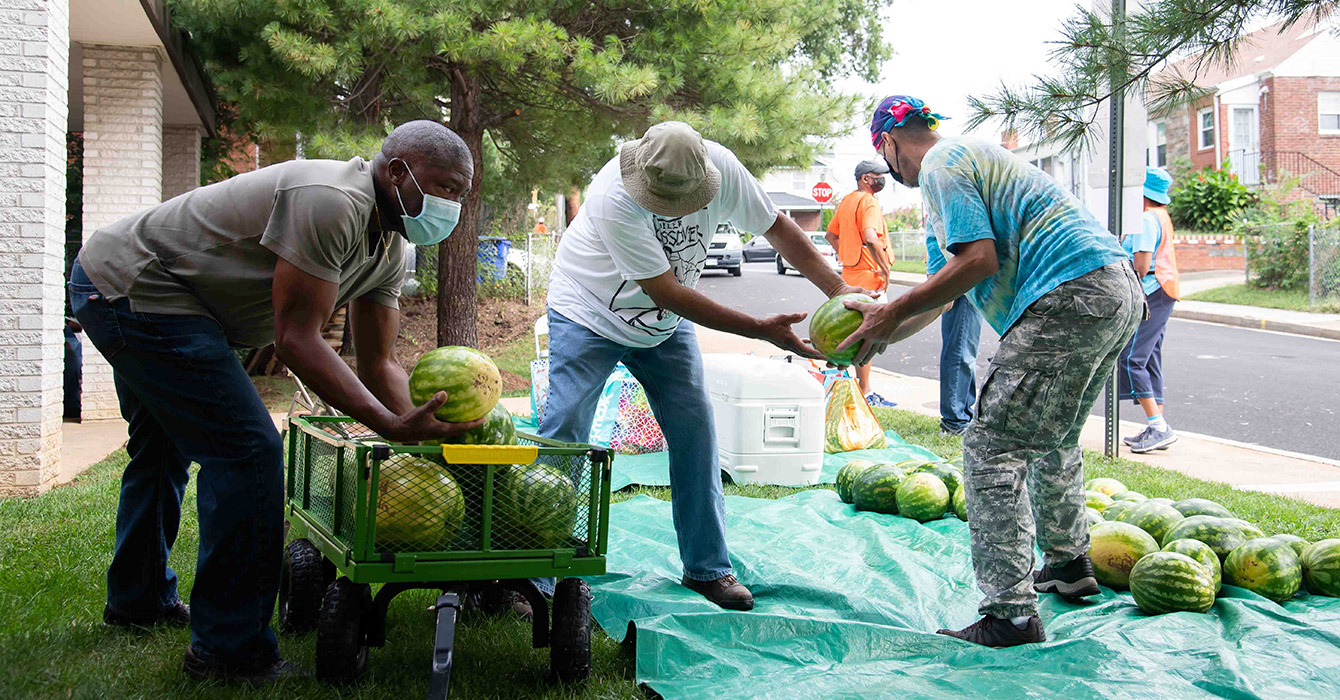
This year’s September event marked Mount Olive’s ninth food giveaway, said Kimberly Taylor, an associate minister at the church and a key organizer for the food effort. The church held three events in 2020, with the first in August and the second and third for Thanksgiving and Christmas.
In 2021, monthly events have occurred from April through September, and Taylor anticipates two more, again for Thanksgiving and Christmas.
While the food giveaways started during the pandemic, they did not emerge from thin air. Mount Olive sets aside thousands of dollars each year for missions work and offers a variety of programs under its hospitality, outreach and service ministries, with staff seeking to make the church a warm and welcoming place for both congregants and the community.
This work includes ministries for intercessory prayer, sign language services, cooking and fellowship hosting, and more. The church has also provided rental assistance, legal assistance and more to its members, Victor said.
So when the coronavirus pandemic set upon the nation in early 2020, the church’s leadership and members wanted to help. As people lost their jobs, it became clear that many needed a hand with basic necessities like rent and, of course, food.
Victor — a pastor with 30-plus years of experience, with roots in Kentucky — said he and the staff had become aware of certain needs even before the crisis. For instance, when they learned that some local college students were facing food insecurity, the church distributed food like shelf-stable milk and cereal to a Washington, D.C., university.
What sacred acts is God calling your faith community to do with and for your neighbors?
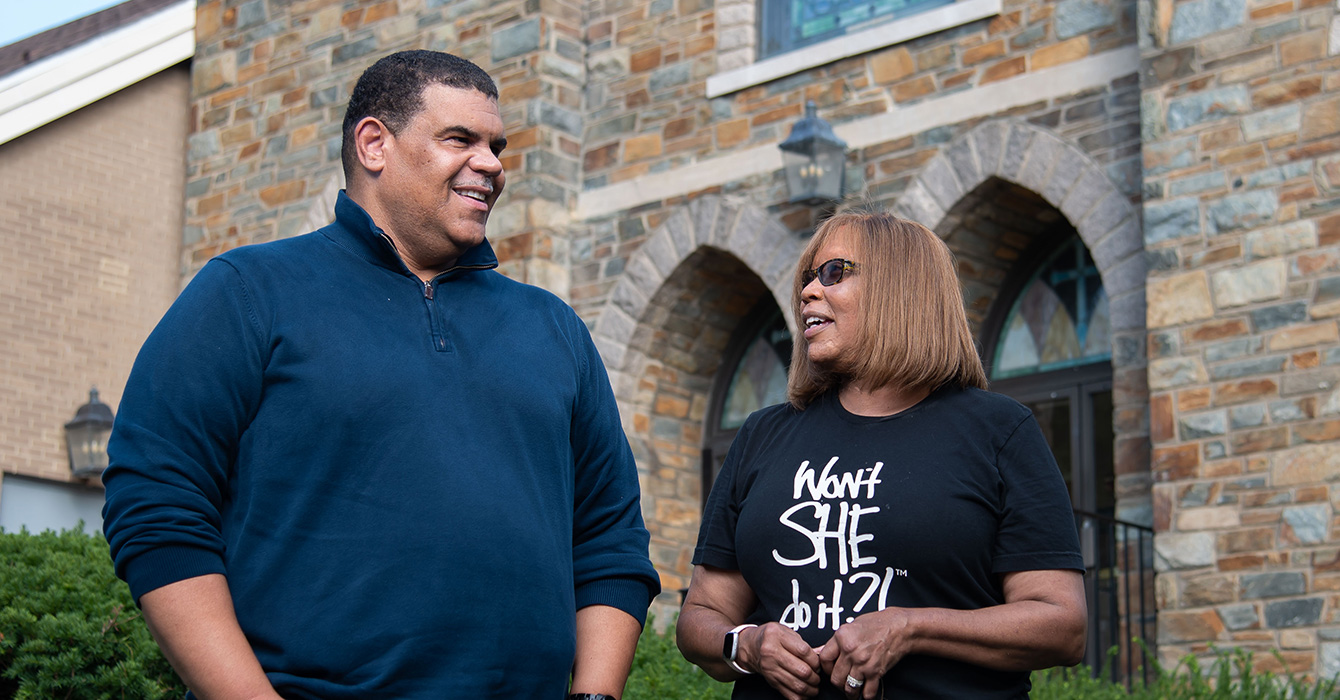
Their pandemic-related mission became clear in April 2020 when Mount Olive was awarded a grant of $10,000 from the Arlington Community Foundation to provide “emergency assistance to low-income and food-insecure residents, including … help with urgent bills.”
Mount Olive staff initially decided to use the grant for food donations and rental assistance. But, as Victor explained, when the 2020 eviction moratoriums kicked in, church staff discovered that the real need was food.
Families had lost wages and employment. Some people were having trouble even getting to the grocery store, and more were having trouble paying for the groceries themselves.
Mount Olive started buying grocery store gift cards for community members who needed food. It was a multigenerational project: they paired older adults and immunocompromised people with younger members who could do their grocery shopping and deliver the food directly to their homes, allowing recipients to avoid being in crowded indoor spaces.
The grant money funded this initial effort, helping 88 households and nearly 200 people in all, Taylor said, but the $10,000 was exhausted within weeks.
Seeing the impact of the food program, and the financial need, church members began donating to the effort to keep it going. And as the need continued and racial injustice issues captured the nation’s attention, the church sought to work with Black farmers who could provide fresh food.
In August 2020, Mount Olive held its first giveaway with farm-fresh produce. Volunteers took careful safety precautions — wearing masks, asking recipients to stay in their cars as food was placed in their trunks, for instance, to avoid close contact. But, Victor said, they also prioritized caring for their neighbors.
“It was a way to balance our faith with the reality of what was going on,” Taylor said, in a community and nation that had been facing not only a pandemic but persistent racial injustice.
The Black farmer connection
The Rev. Palmer Bunting is a Black farmer who inherited his farm, Bunting Farms, from his grandfather Eddie Palmer. In August 2021, a year after that first giveaway event, Bunting shared some thoughts from his tractor while cultivating sweet potatoes.
How can you attend to racial injustice and other systemic inequities while meeting local needs?
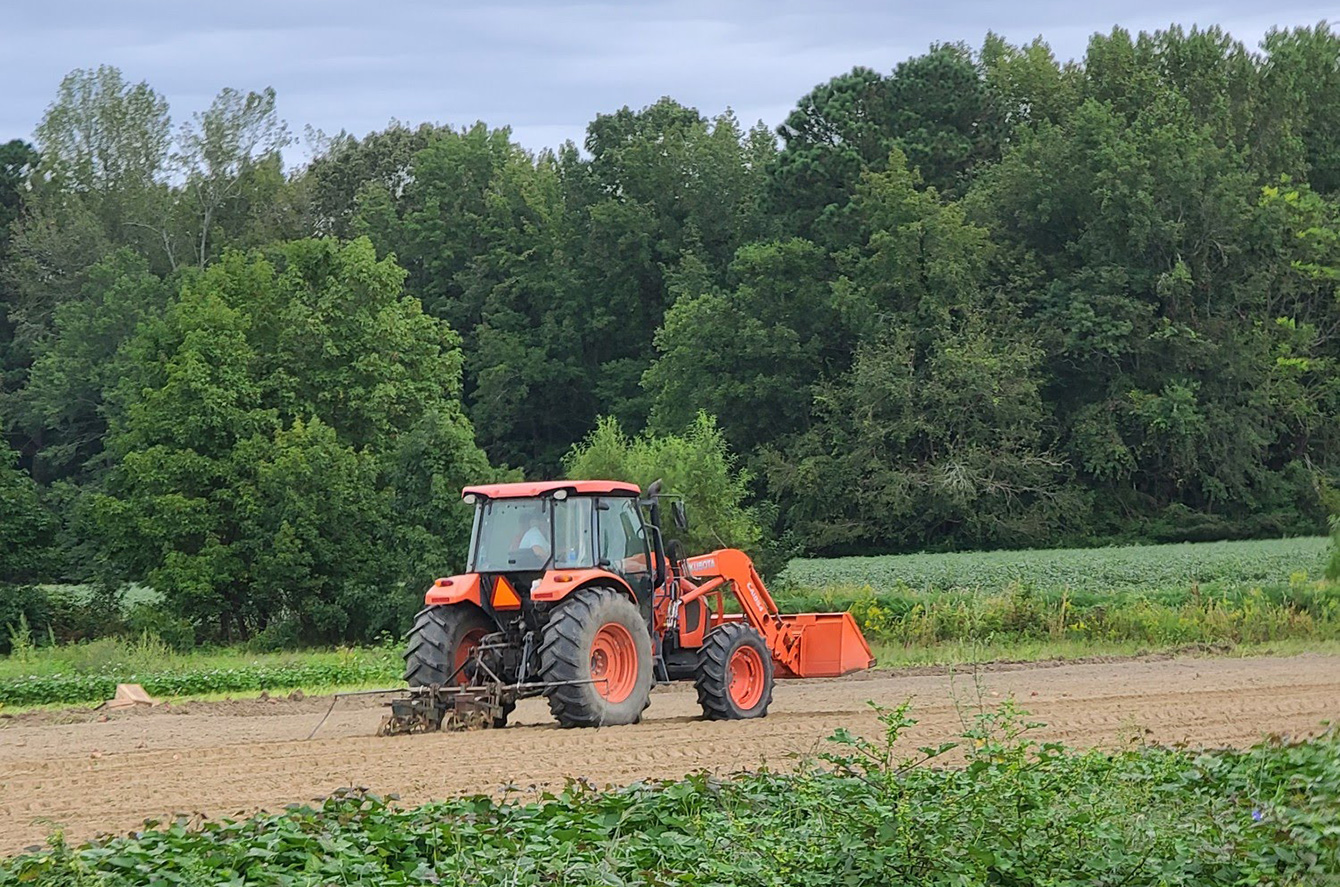
Bunting’s farm is in Onancock, Virginia, a coastal area more than three hours by car from the church. He began working with Mount Olive in 2020, as Victor looked to partner with Black farmers so the church could help another population affected by the pandemic.
Bunting’s farm — which also grows collard greens, kale and more — typically sells to churches, grocery store chains, farmers auctions and farmers markets. But when restaurants, markets and churches are closed or at partial capacity, the business can suffer.
“Farming has always been difficult for all farmers, but especially Black farmers,” Bunting said. “Black farmers have not always had access to the resources, the credits or the education that was made easily available to our counterparts.”
Where is God calling you and your faith community to give heartily and generously?
When Mount Olive works with farmers, it matters.
“When they purchase produce from Bunting Farms, it keeps persons employed, it provides revenue for my farm, and it also provides produce to those persons in that community at Mount Olive who are in need of fresh vegetables,” Bunting said.
Bunting Farms staff pack and transport the produce by trailer right to the doorstep of Mount Olive.
For Bunting — a pastor himself who has served at Ebenezer Baptist Church in Exmore, Virginia, for nearly 20 years — the exchange resonates.
“In the season in which we are living, we need to utilize the faith that we have in God to provide us all of our needs,” he said, noting that he is open to working with other churches as well.
“Faith is what produces the crops that I have. … This whole farming operation is one big faith walk.”
By working with Mount Olive on its food program, most recently providing fresh produce for the church’s July distribution, Bunting has seen that faith walk come full circle, he said.
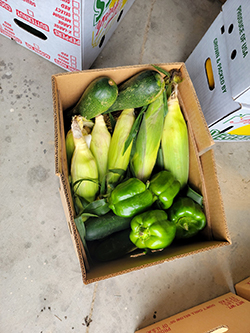
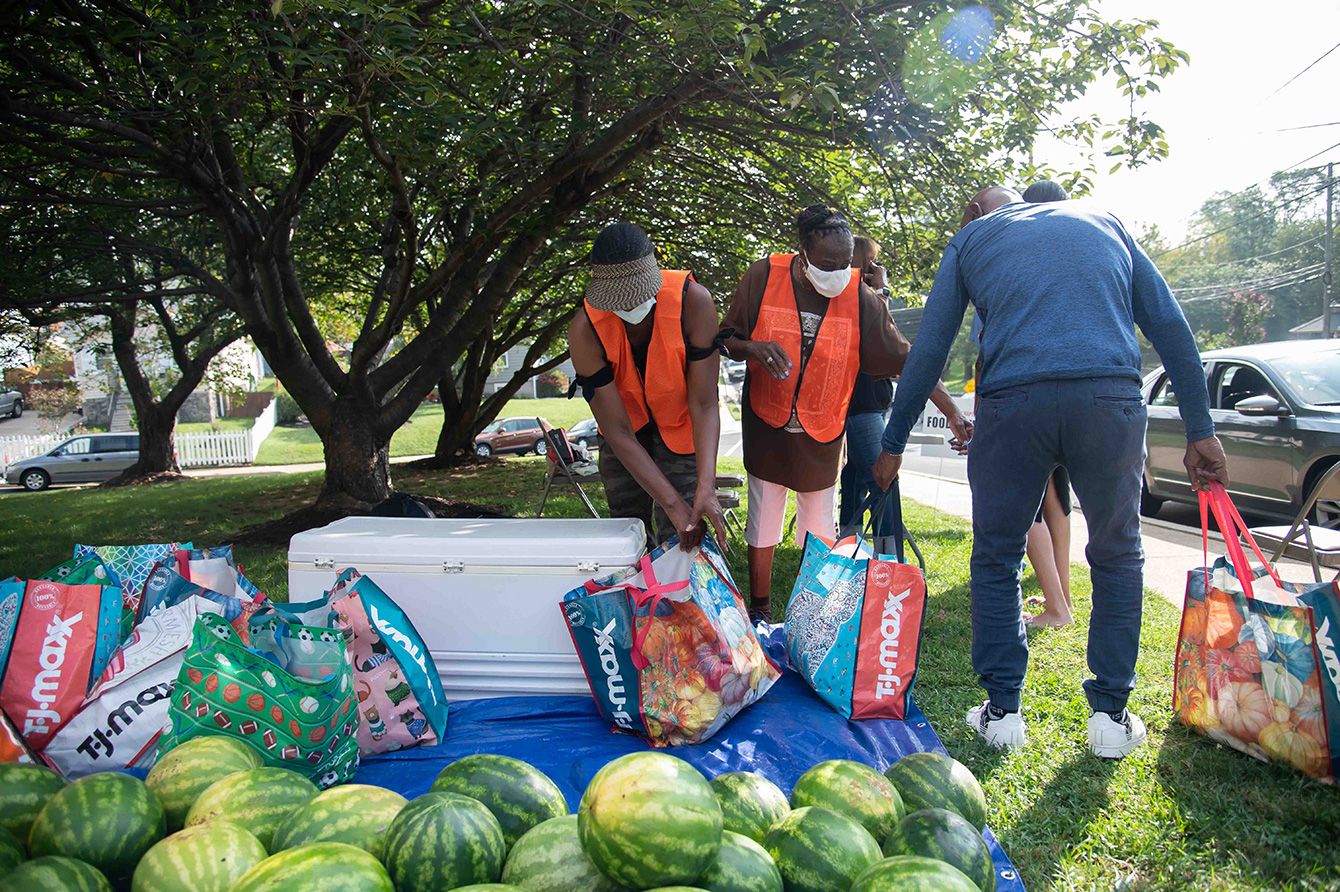
Making a difference
During the food distribution event in September, a home health aide and church member named Linda arrived to pick up some donated food.
Wearing blue scrubs, sneakers and a face mask, she made her way to the front of the church. After greeting the volunteers, she retrieved food for herself as well as some older adults with no transportation.
She explained that the donation would help feed her seven grandchildren who come to visit. The food in her bag would last for about “three cookings, about three different servings,” she said.
Linda would also share the items in her bag with her sons and their families.
“The watermelon — we’ll probably cut it up and we’ll split it,” she said, and they’ll figure out who should receive the chicken. “It’s just a blessing to be able to come and get this food, and then it’s a blessing to be able to serve — help someone else.”
Three servings of food certainly can be helpful, and bags can last even longer for smaller households. These packages — including those given for Thanksgiving in 2020, when the lines of people in need extended for blocks beyond the church — tend to be hearty.
Depending on what the church obtains from suppliers (whether it purchases from Bunting Farms or receives donations from the Capital Area Food Bank), the bags contain fresh vegetables like collard greens, turnip greens, corn and potatoes, along with some shelf-stable products. One giveaway included 25-pound sacks of sweet potatoes.
The church uses donations to make sure there is some form of protein in the bags, including turkey for Thanksgiving 2020, Taylor said.
And if the church doesn’t give all food away during the events on-site, they donate it to people in nearby communities.
“This year, we’ve served over 875 families,” Taylor said, noting that the church has helped more than 3,000 people. And while the number of people served has gone down as some have returned to work, the need is still there.
“If people need to eat,” Taylor said, “we’re still providing food.”
How are the needs in your community changing with the seasons of the pandemic? How can you adapt your responses?
Questions to consider
- What listening practices attune your faith community to the needs of your neighbors?
- What sacred acts is God calling your faith community to do with and for your neighbors?
- How can you attend to racial injustice and other systemic inequities while meeting local needs?
- Where is God calling you and your faith community to give heartily and generously?
- How are the needs in your community changing with the seasons of the pandemic? How can you adapt your responses?

